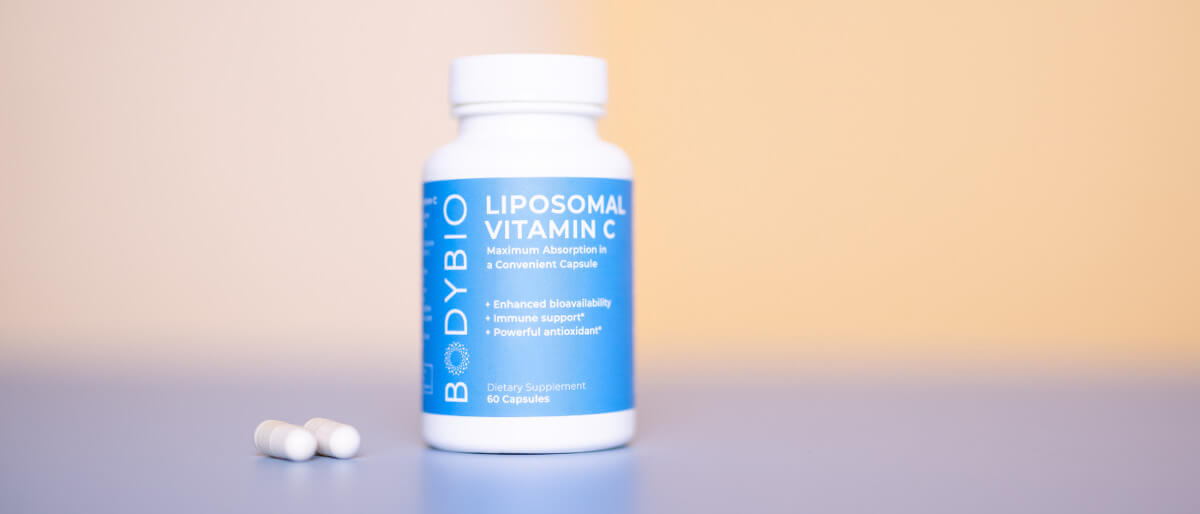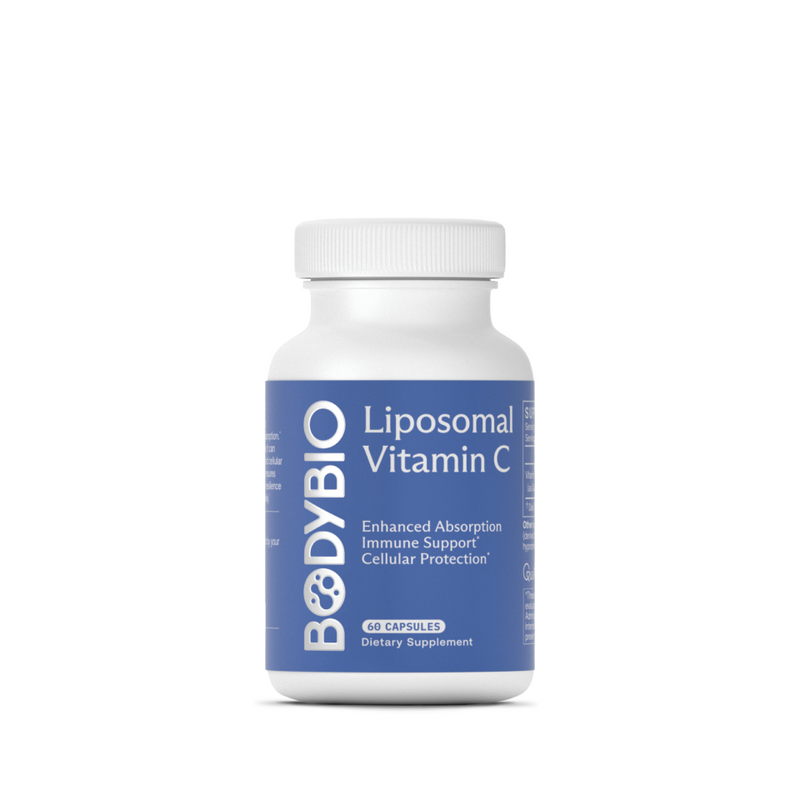Liposomal Vitamin C: Benefits and Frequently Asked Questions
Authors:

Dr. Thomas Wnorowski
PhD, CNCC Research Director, BodyBio & Biomedical NutritionistMany of us already know the benefits of vitamin C, both in our diet and supplement form. It’s probably the first thing you reach for when you feel a cold coming on due to its well-known antioxidant and immune-boosting power. In fact, according to a survey conducted by National Health and Nutrition Examination Survey (NHANES), 35% of adults take a daily multivitamin supplement containing vitamin C, while another 12% specifically take a vitamin C supplement.
We also know that we can only get vitamin C through our diet. However, just because we’re consuming a certain amount of vitamin C doesn’t mean that the body is able to put that full amount to use within our cells. Vitamin absorption comes down to two factors: gut health and the vitamin itself and its delivery system.
What is Liposomal Vitamin C?
This is where liposomal vitamin C comes in. Liposomal vitamin C is more absorbable and bioavailable in the body because the vitamin C is encased within liposomes, microscopic droplets surrounded by a lipid bilayer, the same kind of barrier as our cell membranes.
This liposome makes vitamin C fat-soluble (instead of water-soluble) and more easily transported into our cells, where it can be used.
Let’s break down the characteristics, benefits, any side effects, and answer some of the most common questions about liposomal vitamin C.
What’s the Difference Between Regular Vitamin C and Liposomal Vitamin C?
“Regular” vitamin C, also known as ascorbic acid, is what you’ll find in most vitamin C supplements as a powder, tablet, or capsule.
This type of vitamin C is water soluble, meaning it’s absorbed in water. Although our bodies contain a lot of water, the structure of our cells is made of lipids—fat. As we know, oil (fat) and water do not mix; they repel each other. This means that water-soluble vitamin C is not absorbed very well into our cells where it is most needed.
Only very low doses of standard vitamin C can be well absorbed by the body; the higher dosage you take, the lower the absorption rate! At the commonly recommended 1,000 mg dose, your body can absorb less than half of what you ingest. The rest is excreted mostly into the urine. This means that taking oral “megadoses” of vitamin C isn’t really doing you much good, not to mention can cause digestive upset. [1]
Liposomal vitamin C, on the other hand, is still ascorbic acid, just encased in a liposomal form—surrounded by a lipid bilayer that allows for easier access into the cell. This means that it is far more absorbable and bioavailable in the body, ready to be used as needed. [2] As a supplement, you get more value out of a liposomal formula than a water-soluble formula.
Liposomal vs. Standard: Benefits of Liposomal Vitamin C
Liposomal vitamin C essentially has the same benefits as standard vitamin C, you’re just more likely to notice the results due to its higher absorption ability. These are some of the primary areas in which vitamin C supports the body.
Skin health*
Vitamin C helps the body produce collagen, the structural “glue” that holds us together.* Collagen is essential for cellular integrity, helping to keep out pathogens and toxins from the cytoplasm and the cell nucleus, where they can cause real damage.
It’s also what helps skin retain its smoothness, bounce, and elasticity. You’ve probably heard dermatologists and skincare enthusiasts recommend a “vitamin C serum”—this is why! [3, 4]
Heart health*
Vitamin C is our most essential antioxidant, protecting nutrient molecules like proteins and lipids from oxidative stress and damage.* For heart health, in particular, it inhibits oxidation of LDL-protein, which reduces atherosclerosis. It has also been linked in some studies to improvements in arterial stiffness, lipid profiles, and endothelial function. [5]
Mood boost*
Vitamin C helps synthesize neurotransmitters like dopamine and norepinephrine, the chemical signals that regulate our mood.* Real liposomal vitamin C can easily cross the blood-brain barrier, where it can be immediately used for mental support and mood regulation. [6]
Without adequate vitamin C, researchers found that study participants had a depressed mood and increased cognitive impairment. [7]
Immune support*
We need strong immune systems more than ever, and vitamin C is your immune system champion. Research shows that vitamin C reduces the number of common colds by half in physically active people. [8]
How to Choose a Quality Liposomal Vitamin C Supplement
There are lots of liposomal vitamin C supplements on the market nowadays, but not all of them are truly liposomal or have the most effective liposomal formula.
Here are a few things you should look out for when searching for the right liposomal vitamin C supplement (and everything you’ll find in BodyBio Liposomal Vitamin C).
Look for purity without fillers or additives
Ascorbic acid itself is often used as a preserving agent in other food products and supplements, so you’re less likely to find added junk in a straight ascorbic acid vitamin C supplement. Still, fillers and additives are used all the time to make supplement products cheaper and last longer on the shelf.
Make sure to read your labels when looking for a liposomal vitamin C supplement, and check for unnecessary additives. All you really need is ascorbic acid and the liposomal formula.
Our liposomes are pure phosphatidylcholine (PC) derived from non-GMO sunflower, so you’re also getting the benefits of PC along with your vitamin C!
Now our new Liposomal Vitamin C allows you to skip that step and get the liposomal vitamin C benefits from easy-to-take capsules.
Choose a company committed to quality research and testing
After looking at ingredients and formulation, look at the overall producing company. Are they committed to science-based research and quality testing? Do they ensure a high-quality product with the best ingredients? Do they collaborate with cutting-edge healthcare professionals? Are they actually committed to serving their customers’ health more than increasing their bottom line?
At BodyBio, the answer to every one of these questions is absolutely yes—no exceptions.
Liposomal Vitamin C FAQs
Here are some quick answers to your most frequently asked liposomal vitamin C questions.
Is liposomal Vitamin C better than regular Vitamin C?
Vitamin C, in general, is supportive of your health, and we need to get it from our diet and/or supplementation. The main difference between “regular” vitamin C and liposomal vitamin C is that the liposomal version is better absorbed and more easily used by your cells. In our book, yes, that makes it better.
That being said, you should always look to get vitamin C from whole foods in your diet as well, like citrus fruit, berries, bell peppers, etc.
Why is your BodyBio Liposomal C not a liquid in a softgel?
Unlike traditional liposomal encapsulation methods, BodyBio Liposomal C is ‘proliposomal’. This enables the use of powdered liposomes - free-flowing particles that immediately form a liposomal suspension when mixed with water when digested. So you get all the benefits of a true liposomal vitamin C in the convenience of a capsule—no messy liquids required.
What’s the recommended dosage of liposomal Vitamin C?
For BodyBio Liposomal Vitamin C, we recommend a standard dosage of 2 capsules daily, providing 1,000 mg of liposomal vitamin C. The upper limit for adults is 2,000 mg per day of vitamin C. If you have complex health concerns, consult with your healthcare professional.
Does liposomal vitamin C have any side effects?
Standard vitamin C can easily cause digestive upset if taken in high doses. Liposomal vitamin C C, however, since it is much more rapidly absorbed and used by the body, is far less likely to cause any side effects, as it is much more rapidly absorbed and used by the body,. Still, you should follow your health practitioner's direction on a dose that is appropriate for you.
What time of day should you take liposomal Vitamin C?
You can take liposomal vitamin C at any time of day, but vitamin C can cause an energy boost in some people, so it may be best to take it in the morning rather than the evening. Otherwise, take it with or without food, daily or as needed for immune or neurotransmitter support.
Can you take too much liposomal Vitamin C?
Vitamin C is well known for causing gastrointestinal distress when taken in high doses. However, liposomal vitamin C minimizes this risk because it bypasses typical absorption constraints in the gut and is rapidly absorbed into the cells.
Though unlikely, liposomal vitamin C may initiate a Herxheimer reaction––flu-like symptoms that can occur when the body begins to rapidly detoxify, and the elimination systems become overwhelmed with the sudden toxic burden released from the tissues. If this occurs, simply cut back on your dosage or stop altogether until you recover. As always, consult with a healthcare professional if you have a reaction or concern about using liposomal vitamin C.
Does Vitamin C thin your blood?
Further studies must be conducted on the blood-thinning effects of vitamin C, although it may have benefits in removing excess cholesterol from the blood to help make it thinner and lower blood pressure.
What medications or supplements should you avoid if you’re taking liposomal Vitamin C?
There are very few contraindications of taking liposomal vitamin C with any other medication or supplement. However, some contraindications exist with blood disorders such as sickle cell disease and hemochromatosis. You should also avoid taking vitamin C before or following an angioplasty procedure.
You may have heard that vitamin C raises blood sugar levels, but research actually shows that 1,000 mg per day of vitamin C can lower blood glucose and lipids in those with type 2 diabetes. [9]
Ensure You’re Getting the Vitamin C You Need with Bodybio
As many businesses, restaurants, and shops are opening up again and we look forward to more social gatherings this summer, liposomal vitamin C can provide extra immune support for you and your family. Along with a healthy dietary pattern, invest in a vitamin C supplement that works for you on a foundational cellular level.

